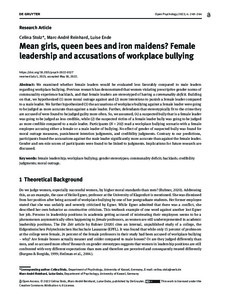Mean girls, queen bees and iron maidens? Female leadership and accusations of workplace bullying
| dc.date.accessioned | 2023-07-26T11:42:22Z | |
| dc.date.available | 2023-07-26T11:42:22Z | |
| dc.date.issued | 2022-10-11 | |
| dc.identifier | doi:10.17170/kobra-202307268490 | |
| dc.identifier.uri | http://hdl.handle.net/123456789/14929 | |
| dc.description.sponsorship | Gefördert durch den Publikationsfonds der Universität Kassel | |
| dc.language.iso | eng | |
| dc.rights | Namensnennung 4.0 International | * |
| dc.rights.uri | http://creativecommons.org/licenses/by/4.0/ | * |
| dc.subject | female leadership | eng |
| dc.subject | workplace bullying | eng |
| dc.subject | gender stereotypes | eng |
| dc.subject | communality deficit | eng |
| dc.subject | backlash | eng |
| dc.subject | credibility judgments | eng |
| dc.subject | moral outrage | eng |
| dc.subject.ddc | 150 | |
| dc.title | Mean girls, queen bees and iron maidens? Female leadership and accusations of workplace bullying | eng |
| dc.type | Aufsatz | |
| dcterms.abstract | We examined whether female leaders would be evaluated less favorably compared to male leaders regarding workplace bullying. Previous research has demonstrated that women violating prescriptive gender norms of communality experience backlash, and that female leaders are stereotyped of having a communality deficit. Building on that, we hypothesized (1) more moral outrage against and (2) more intentions to punish a female leader compared to a male leader. We further hypothesized (3) the accusations of workplace bullying against a female leader were going to be judged as more accurate than against a male leader. Further, defendants that stereotypically fit to the crime they are accused of were found to be judged guilty more often. So, we assumed, (4) a suspected bully that is a female leader was going to be judged as less credible, while (2) the suspected victim of a female leader bully was going to be judged as more credible compared to a male leader. Participants (N = 202) read a workplace bullying scenario with a female employee accusing either a female or a male leader of bullying. No effect of gender of suspected bully was found for moral outrage measures, punishment intention judgments, and credibility judgments. Contrary to our predictions, participants found the accusations against the male leader significantly more accurate than against the female leader. Gender and sex-role scores of participants were found to be linked to judgments. Implications for future research are discussed. | eng |
| dcterms.accessRights | open access | |
| dcterms.creator | Stolz, Celina | |
| dcterms.creator | Reinhard, Marc-André | |
| dcterms.creator | Ende, Luise | |
| dcterms.extent | 249–264 | |
| dc.relation.doi | doi:10.1515/psych-2022-0127 | |
| dc.subject.swd | Weibliche Führungskraft | ger |
| dc.subject.swd | Mobbing | ger |
| dc.subject.swd | Arbeitswelt | ger |
| dc.subject.swd | Moral | ger |
| dc.type.version | publishedVersion | |
| dcterms.source.identifier | eissn:2543-8883 | |
| dcterms.source.issue | Heft 1 | |
| dcterms.source.journal | Open Psychology | eng |
| dcterms.source.volume | Band 4 | |
| kup.iskup | false |
Files in this item
This item appears in the following Collection(s)
-
Artikel [1186]


